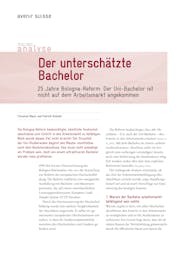In 1999, the signing of the Bologna declaration launched the reform of European higher education. This reform established a two-part education with bachelor’s and master’s programs based on a unified credit system. The aim of this harmonization was to improve diploma recognition and create a common European higher education area. In addition, all diplomas, including the university bachelor’s degree, were to enable entry into the labor market.
In this analysis, Florence Mauli and Patrick Schnell examine whether the goal of making all diplomas employable on the labor market has been achieved. The authors point out that, while a university bachelor’s degree is in principle a prerequisite for entry into working life, this situation is still rare. The result is the problem of training that is too long (overeducation) and misses its target (miseducation).
The authors therefore suggest measures aimed at optimizing the current system:
- The higher the level of education, the lower the costs borne by public finances. This is because the higher the level of education, the more the additional individual benefit (profitability of education) exceeds the additional benefit for society (tax profit).In addition, university curricula need to be examined.
- The bachelor’s degree should focus more on employability, and the master’s on specialization. Depending on the discipline, professional experience could also be a requirement.
Such measures would not only remain true to the spirit of the initial Bologna reform. They could also help reduce the risk of overeducation and miseducation.






